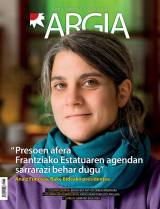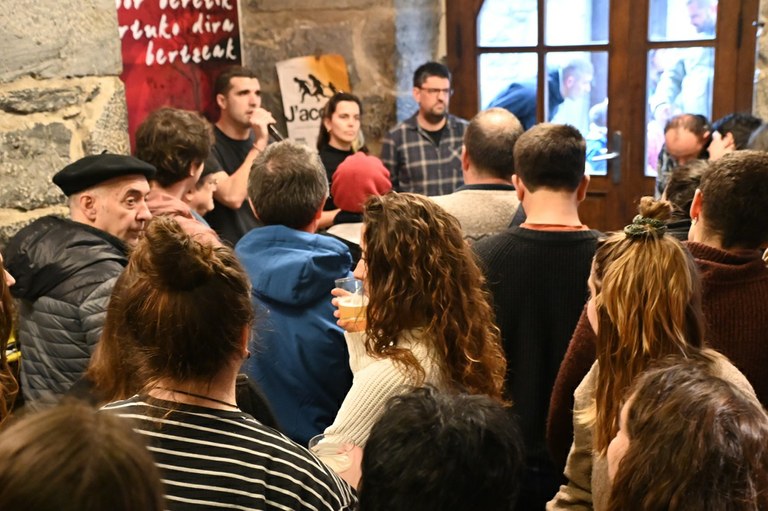Like a great woman
- Roxali de Tupintegra is a twentieth century song, witness a fact that traumatized Iparralde's society. Joyful music, sound word games, sayings and imaginative appearances: everyone, go to Paris to mock a young wife and let go laughed when men met in the inns of the villages.

II. At the end of the World War, in the vicinity of Paris there was a need for arms and hands for reconstruction and to ensure the development announced by the massive subsidies of the 1947 Marshall Plan. There were no more girls from the North, as many from the South also took the path of exodus to work as bonne espagnole. Every woman in the house of the Paris bourgeoisie wanted her to clean up, care for the children and strengthen her sense of ownership in exchange for sleeping, satiating and little money.
The author of the series of verses Roxali de Tupintegra knew the citizens who headed for Paris, perhaps their sisters, because these coplas show that the author is eminently male. In those times men controlled and carried without sharing the guides of cultural creation. The blood ran through the ground and the young people were affected by the bush. Less gross were the discharges they suffered, even though Niko Etxart and Anje Duhalde offer us a lot of Buneta and Txapela, the great Ligeix of Larraine.
The cave between those who remained in the village and those who were banished to Paris is still open in Ipar Euskal Herria: in the city there was (supposedly) the way out of the brow, the work to live without being rich, the novelty, the form of anonymous realization. In the countryside, on the other hand, everyone had the security to stay clean and quiet under the wings of violent social control, in a distant home:
I would like to be in the hull of
the bunet, Ene Sor-lekhü maite Uxkal-Herrikuan.
Yhurk, not knowing what he has in
his mind, was in Kobla.
The Church, using sarcasm and truffle, tried to soften the drama of the separation of wives. First of all, no one had to turn a Lili Roxali from Paris rather than a friendly and noble wife.
Newspapers like Herria or Sokorri were published for young people who spread an apocalyptic view of the city: for girls it was a particularly loving place for cats, the children of the lords of the house became officials, therefore, in useless beliefs that persist in our laborious worlds to this day. The agriculture sector was undergoing transformation, mechanizing and deserting populations. The Church, using sarcasm and truffle, tried to soften the drama of the separation of wives. She entered the education of girls for example in 1952 Piarres Narbaiz (1910-1984) published the book Reflexiones de Kattalin (Elkar, 1999). From his hand we also have the Xaramela collection, from 1951, which is expanding from generation to generation. First of all, no one had to turn a Lili Roxali from Paris rather than a friendly and noble wife.
Lili Roxali de Paris Bai
frantximent bai bai t’es xoli…
We don’t know who wrote the coplas that have the title of Roxali de Tupintegra. The lyrics were new, like a melody. Her mother sang in Paris when she had learned that she was an assistant. In 1950, they were already famous. It may be thought that it is a work that has been poured out of the pen of a priest writer from El País (until 1944). At least I think so, because at some point I saw him baptized with Ithurralde's nickname. And that was the second last name of Piarres Lafitten (1901-1985), which he used as a pseudonym of the arts. In the background, the property of the text would correspond to the flirty and unwarm humor of the luhuso.
Tantilulilu tiluli…
The ceremony of the Church of Santa Maria of San Juan de Borbón, in Iparralde, was the first time that the Church of Santa María de Borbón. The famous 'Roxali' of Tupintegra is witnessing this connection
Banishing their wives and relinquishing the Basque Country went hand-in-hand at the tip of the bertsolari language, while Paris became a giant ghost. The ceremony of the Church of Santa Maria of San Juan de Borbón, in Iparralde, was the first time that the Church of Santa María de Borbón. In the famous Roxali de Tupintegra there are plenty of signs of this union: caskoin…, it does not say “bonxur” to what it is…, it is not enough with your hand, but if you know French…, I do to Roxal…
It is also seen how since the two world wars the Basque Country was fetishized. The teachings of nationalism of Arana Goiri soon crossed the border and those happy fews of the group of authors of this song were Basque, some of which would be resolved since 1940 with the ideas of the Government of Vichy, for example, with the Anti-War. On the other hand, in those years the Basque Country was the property of a decent social class that would not have been sold as a slave. The intellectual leaders of the peasant counties were the guardians of morality, and for them Baiona himself was a demonic place: coming into contact with the reds, where, together with the purity of the blood, the language was lost.
Roxali
Tantilulilu-tiluli
de
Tupintei Roxali
Pariste de
Tupintei Back
All
about common heel… Roxali de Tupintei returns from Paris.
I-i-i-. From the same
home of Roxali comes the social irony of the author of the song: the thorns are of land during francs, not of gold, weak, fragile, quite comical with their swollen vientres. In these verses it is noticed that in the Tupintegia there was something I could not endure. Unbearable, as is evident for a truly rich and rich neighborhood.
It looked like a great lady Tantiruriruru-tiruri Like
a great lady Doesn’t say “bonxur” to everyone
No to the “bonxur” Red lips That hair White eye… It looked like a great lady
No to those who say “bonxur”. I-i-i-. Here's the crossing point between class
contempt
and gender humiliation. The woman who makeup herself, if she also molested the French, is decorated by the characteristics of the appearance of prostitute, to the detriment of Roxali, in order to make people laugh by combining different consonants, as shown by the tantitururi-tiruri sounds i-i-i.
Walking around
the street Tantikukiku-tikuki, from
one
side
to the
other Ai espantuka
knows
Luxe Mehe Ai tetele Kale, xut-xut walking, Ai espantuka.
I-i-i-.
Bertsolari does not forgive him: it is not for him to put his class of origin in pride.
Roxali walks us down the street making noise with his calves. He wants to go to Paris and show that he has achieved something, that he has learned, but bertsolari does not forgive him: anything he does is a frightening thing, it does not serve to force him, it does not correspond to his class of origin, to whoever sells children, that is to say, to get into pride: everyone in his place and to cure the last word.
Don't touch
me.
Don't touch me.
But if you know French.
Kiskun
Kaskun J’en
suis kaskun Pas.
Don't touch me too much,
but if you knew French.
I-i-i-.
As a challenge, Roxali denies his Basque identity by pronouncing j’en suis kaskun. Or it's the ghost of the author of the song. Because he rips the Frenchman without fear of mistakes, he thinks he rejects the Basque, because they cannot live together. The soldiers who returned from the Fourteen War were accused of almost the same thing: in addition to being severely beaten, it was sung that the Basque and French had not learned…
But if Roxali de Tupintegra could stay Euskaldun following the recommendations of the author:
Lili Roxali
from
Paris Tantilulilu-tiluli
Lili Roxali from Paris
Bai frantximant, bai
t’es xoli… Leave
Fashion Ai
potreta ink… Lili Roxali from Paris I make eskuali!
Married and well married, the singer pointed as a last plan the way to become a lady at home: to despise makeup and dress brilliantly and show more Euskaldun. In general, even today, Basque women do not necessarily wear panpox, but the clothing code of the Basque condition is quite homogeneous: dark colors, rudders on t-shirts, sharp haircuts… the generations of women who interiorized the models established for Roxali to this day.
We are the cold children of many of us, the Roxali.
Vagina Shadow(iko)
Group: The Mud Flowers.
The actors: Araitz Katarain, Janire Arrizabalaga and Izaro Bilbao.
Directed by: by Iraitz Lizarraga.
When: February 2nd.
In which: In the Usurbil Fire Room.
In recent years, I have made little progress. I have said it many times, I know, but just in case. Today I attended a bertsos session. “I wish you a lot.” Yes, that is why I have warned that I leave little, I assume that you are attending many cultural events, and that you... [+]























